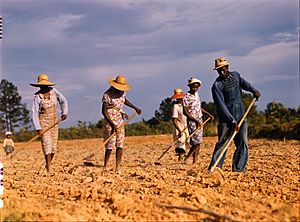Delta Ministry facts for kids
The Delta Ministry was a very important group during the Civil Rights Movement in Mississippi. It started in September 1964. The National Council of Churches created it to help Black people in the South fight for freedom and equal rights. The Delta Ministry worked with other local civil rights groups like the SNCC, NAACP, and CORE. It grew to be the biggest group in Mississippi, offering many services and programs to Black communities through the 1980s. It had a big impact on the fight for equality in Mississippi.
Contents
What Was the Delta Ministry?
The Delta Ministry wanted to help people in the poorest parts of Mississippi. It aimed to provide food and clothes, education, and training. It also helped people start their own projects and develop their communities. A key goal was to help local leaders grow their skills. The Ministry mainly worked in the Delta region. It also helped in cities like McComb and Hattiesburg.
Helping Communities in Mississippi
The Ministry successfully pushed state and federal governments to give money to the poorest communities. It also gave out tons of food and clothing to local Black families. It helped set up health clinics in Mound Bayou and Greenville. These clinics were paid for by the government. The Delta Ministry also helped about 70,000 Black people register to vote. This was a huge step for their rights.
Challenges Faced by the Ministry
The Delta Ministry always had big plans, but not enough money. Sometimes, their plans were not very realistic. They also had high expectations for the poor people they were trying to help. Many of these people had little education.
The Freedom City Project
One example of a challenging project was Freedom City. This was a community started in 1966 near Greenville. It had 94 residents and was on 400 acres (1.6 km2) of land. The idea was to create a new home for Black farm workers who had lost their jobs. It aimed to teach them how to be self-sufficient and politically independent. However, this ambitious project did not succeed.
Working with Other Groups
The Delta Ministry also faced some disagreements with other groups. For example, some Black middle-class people and their churches did not offer much support. They sometimes thought the Ministry's efforts were too extreme. There were also disagreements with activists from the NAACP. The NAACP often preferred slower, more gradual changes.
Internal Disagreements
From the late 1960s, the Delta Ministry faced more problems from within the group. These internal issues affected their work more than outside resistance. In 1967, Owen Brooks became the director. He was a Black man from the North. Under his leadership, the group split into two parts. They had different ideas about how to help people. Brooks wanted to work on big goals for the whole state. Other staff members wanted to focus on local projects and leaders. After 1977, the Delta Ministry mostly became a one-person organization led by Brooks.
 | James B. Knighten |
 | Azellia White |
 | Willa Brown |


